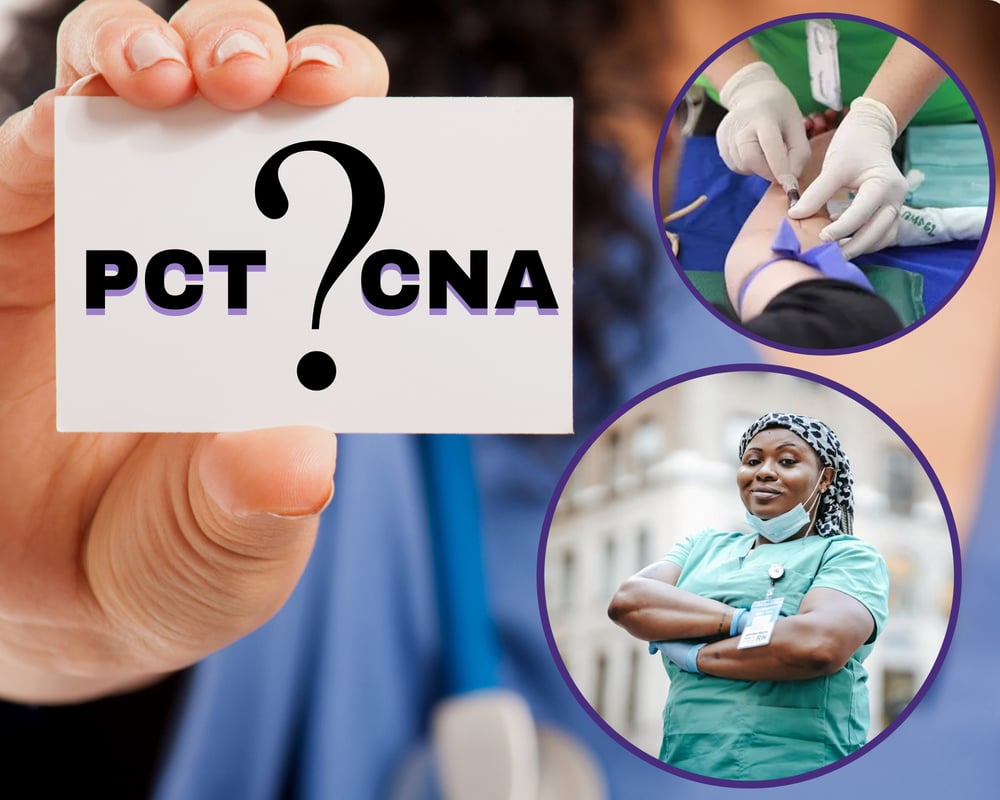Difference Between a PCT and CNA

Looking for a rewarding career in the healthcare industry? Becoming a Certified Nursing Assistant (CNA) or Patient Care Technician (PCT) may be a perfect choice! Keep reading if you’re still debating whether to become a PCT or a CNA. This blog will help you understand the distinctions between these two vocations and will aid you in making a decision. Let’s get started!
Job Outlook
According to the Bureau of Labor Statistics, employment for CNAs and PCTs will grow 5% from 2021 to 2031. There will be an increased demand for healthcare services as the population ages. This leads to a higher demand for PCTs and CNAs.
Work Setting
PCTs and CNAs work in various healthcare settings. It’s always worth noting that they both work under the supervision of a registered nurse or a nurse practitioner. PCTs work in dialysis centers and urgent care centers such as emergency rooms, medical-surgical units, and doctor’s offices. In dialysis centers, they help set up the equipment, prepare the patient, monitor their vital signs during the procedure, and document the treatment. They also perform tasks such as weighing patients, taking blood samples, and cleaning and sterilizing equipment.
In urgent care centers, PCTs may perform a variety of tasks to support the medical staff. They may take vital signs, obtain medical histories from patients, perform basic laboratory tests, and assist with minor medical procedures. They may also assist with patient triage, helping to determine the order in which patients are seen based on the urgency of their medical needs.
On one hand, CNAs typically work in hospices, nursing homes, and home healthcare agencies. In nursing homes, CNAs provide care to elderly residents who may have a range of physical and cognitive impairments. They help residents with daily activities such as eating, grooming, and getting dressed. They also help residents with mobility, transferring them from bed to chair and assisting with walking.
In home healthcare agencies, CNAs provide care to patients who are recovering from illness or injury in their own homes. They may assist with personal care and provide help with household tasks such as meal preparation and light housekeeping.
Both PCTs and CNAs are employable in government agencies and hospitals. This allows them to choose a work setting that aligns with their interests and career goals.
Salary
Both receive benefits such as health insurance, retirement plans, and paid time off. Their salaries depend on the work setting, location, and experience level.
The BLS has no specific report about the salary of a PCT, but according to Indeed.com, their median annual wage is about $46,000, at $17 an hour. For CNAs, the median yearly wage is $30,310 as of May 2021. Check out this detailed information on how much a CNA makes.
Career Advancement
Many individuals choose to advance their careers by pursuing more education and training. Some may become LPNs or RNs by completing a nursing program. Read our blog on what comes after CNA.
By obtaining extra certifications, PCTs may specialize as dialysis technicians, EKG/Telemetry technicians, emergency room technicians, hospital PCTs, and rehabilitation technicians.
Achieving one or more of these designations can bring a competitive advantage in the healthcare field. Advanced education and training can lead to higher salaries and more career opportunities.
Conclusion
PCTs and CNAs provide essential care to patients in a range of work settings. Pursuing CNA or PCT can offer excellent opportunities for personal and professional growth. If you enjoy the social and emotional aspects of healthcare or have just transitioned into the healthcare field, becoming a CNA is a good start.
If you want to gain more skills and responsibilities or explore the technical aspects of patient care procedures, becoming a PCT is the way to go. While PCTs require more training and earn a little more than CNAs, both roles have strong job prospects and career advancement opportunities. If you need help finding your vocation, Dreambound is the place for you!
Consider Dreambound as a valuable resource if you're thinking about getting started in this field. We've written many guides to help you:

Fel is a student support representative who guides enrollees to the right program and answers their queries. She's committed to helping students and takes pride in her work. In her free time, she enjoys sightseeing and hanging out with loved ones.




